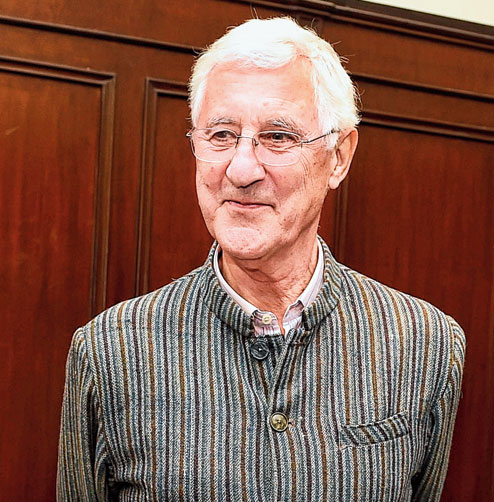
Calcutta: John Michael ('Mike') Brearley, a legendary captain and a practising psychoanalyst, spoke to The Telegraph the other evening.
Mike and wife Mana are currently in India on their annual winter vacation.
Excerpts...
Q Purely as an observer now, do you think the challenges faced by cricketers are much different today?
A Basically, not that different... DRS has made a difference, which on the whole is for the good... D-N Test cricket is good for the game, at least when played in some venues, like Adelaide... The proliferation of technical aids and, of course, the support staff makes quite a difference. It's a lot of input now, for better and worse... Generally speaking, I'm glad that there is now more emphasis on pitches that help both batsmen and bowlers. The T20 format means that the top cricketers need versatility. Decisions have to be made on prioritising the different formats... Public exposure is probably more, especially on social media, but on the other hand there is protection for the top cricketers in that the occasions on which somebody has to appear for interviews is controlled. But, basically, it's still 90 miles an hour with a small hard red ball. The basic strokes, mind you, are the same.
Q As England's captain, what was your biggest challenge and, in your opinion, what would be the No.1 challenge for Virat Kohli?
A The biggest challenge for me was always the basic challenge: How best to use the bowlers, set fields and motivate my players. I imagine all those are also challenges for Virat. As I've told you, I admire him for being clear about his priorities.
Q You were towards the end of your England career when the ODIs began to take wings. Today, the T20 format has exploded... Is cricket on the right track?
A The rapid growth of the T20 domestic leagues is the biggest threat to Test cricket. Especially in countries like New Zealand, Sri Lanka, Bangladesh and the West Indies where money for Test cricketers is not comparable to some of the other countries and where some administrators seem unable to be allies of their main asset - the cricketers. I may add that the T20 leagues have changed the outlook of today's cricketers.
Q Are we unnecessarily worrying too much about the future of Test cricket?
A No, I think the worry is well founded. There needs to be more resting on each Test (more context, in other words), more D-N Tests, a bigger window for Test cricket and certainly more money from the T20 format going to support Test cricket.
Q I assume you'd be delighted to learn that Virat, for one, has been imploring the emerging generation to aspire for Test cricket...
A Yes.
Q Did you sense that integrity could one day be a big issue and that match-fixing would sadly be a reality?
A Never imagined there would be match-fixing and that there would be pressure from the bookmakers. It's a direct result of the money coming into cricket through TV rights and huge audiences... However, in a broader sense, integrity has always been an issue in sport.
Q Were you approached for a rebel tour of South Africa?
A No. Some England cricketers did go, in early 1982, but after I'd stopped playing. I was, of course, totally opposed to official sports contacts while Apartheid was prevalent in South Africa.
[There was a second rebel tour by England cricketers as well, in early 1990.]
Q The final one... How would you describe yourself?
A (Laughs) Ah, a difficult question. Perhaps, you'd like to refer your readers to my new book, On Form !











